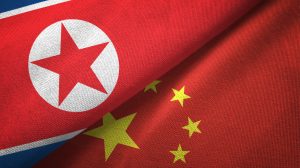North Korea’s Foreign Ministry spokesperson denounced the visit of Nancy Pelosi, the speaker of the U.S. House of Representatives, to Taiwan on Wednesday.
“The current situation clearly shows that the impudent interference of the U.S. in internal affairs of other countries and its intentional political and military provocations are, indeed, the root cause of harassed peace and security in the region,” the North’s state-controlled media KCNA quoted the spokesperson as saying.
While emphasizing Taiwan as “an inseparable part of China,” the spokesperson also backed up Beijing’s recent saber-rattling warnings to the U.S. over Pelosi’s visit by saying that “it is the due right of a sovereign state to take counter measures against the moves of the outside forces openly interfering in its internal affairs.”
“We vehemently denounce any external force’s interference in the issue of Taiwan, and fully support the Chinese government’s just stand to resolutely defend the sovereignty of the country and territorial integrity,” the spokesperson said.
Over the weekend, China conducted a live-fire exercise as a direct warning toward Washington over Pelosi’s visit to the self-governing island. The Chinese military also announced on Tuesday that targeted drills and missile tests will be conducted around Taiwan from Thursday to Sunday of this week.
With the tensions escalating with China, Washington reiterated that its stance on the One China policy has not changed.
“The world has seen the United States government be very clear that nothing has changed about our One China policy, which is of course guided by the Taiwan Relations Act, the Three Joint U.S.-PRC Communiqués, and the Six Assurances,” John Kirby, the National Security Council Coordinator for Strategic Communications, said in a press briefing on Monday. (PRC is an acronym of China’s official name: People’s Republic of China).
Kirby did not directly support Pelosi’s visit to Taiwan but warned China that its actions “could have unintended consequences that only serve to increase tensions.”
In a statement on her visit, Pelosi said “America’s solidarity with the 23 million people of Taiwan is more important today than ever, as the world faces a choice between autocracy and democracy.”
Pelosi and other House representatives have already stopped in Singapore and Malaysia and are also expected to visit South Korea and Japan as part of a broader tour of countries in the Indo-Pacific region. Taiwan was not formally part of the agenda, but Pelosi’s visit was anticipated days before her arrival on Tuesday.
Pelosi also said that the U.S. “continues to oppose unilateral efforts to change the status quo” but, at the same time, emphasized that her congressional delegation’s visit to Taiwan “honors America’s unwavering commitment to supporting Taiwan’s vibrant Democracy.”
Pelosi is the highest-ranking U.S. official to visit Taiwan in 25 years. Both China and the United States have accused each other of violating the status quo in the Taiwan Strait in recent years. Washington says Beijing is increasing military intimidation of Taiwan, possibly in preparation for an outright invasion. Meanwhile, Beijing has strongly denounced increased U.S. exchanges with Taiwan, whose government the United States does not formally recognize.
Pelosi’s visit triggered provocative responses from Beijing. Chinese Foreign Minister Wang Yi said in a statement issued immediately after Pelosi’s plane landed that “This move seriously violates the one-China principle, maliciously infringes on China’s sovereignty and blatantly engages in political provocations… It proves once again that some U.S. politicians have become ‘troublemakers’ of China-U.S. relations, and that the United States has become the ‘biggest destroyer’ of peace across the Taiwan Strait and for regional stability.”
“We would like to tell the US once again that China is standing by, and the Chinese People’s Liberation Army will never sit idly by. China will take resolute responses and strong countermeasures to defend its sovereignty and territorial integrity,” Zhao Lijian, a Chinese Foreign Ministry spokesperson, said on Monday.
From Pyongyang’s perspective, North Korea’s backing of China’s stance is meant to signal the strength of their relationship – and ensure Beijing will continue to protect the North from any sanctions at the United Nations. Meanwhile, siding with China also serves as a way to underline North Korea’s displeasure with and hostility toward the United States.
As Beijing warned that Washington will “pay the price” over Pelosi’s visit to Taiwan, the military tensions around Taiwan will escalate sharply in the next few days. The Chinese military is expected to conduct drills surrounding Taiwan from Thursday.
In the wake of the Ukraine crisis and the North’s preparation to conduct a seventh nuclear test, the Indo-Pacific region and the Korean Peninsula seem likely to be the battlefield of the new Cold War.
Amid the flare-up in tensions surrounding Taiwan, China’s Wang Yi and South Korean Foreign Minister Park Jin will both be attending a series of meetings hosted by the Association of Southeast Asian Nations (ASEAN) from August 3 to 5. Wang will likely be pressuring his dialogue partners to issues statements of support for China’s position, while the United States will want Park to echo Washington’s line.
U.S. Secretary of State Antony Blinken and a North Korean delegate, reportedly its ambassador to Indonesia rather than the foreign minister, will also attend the meetings.

































